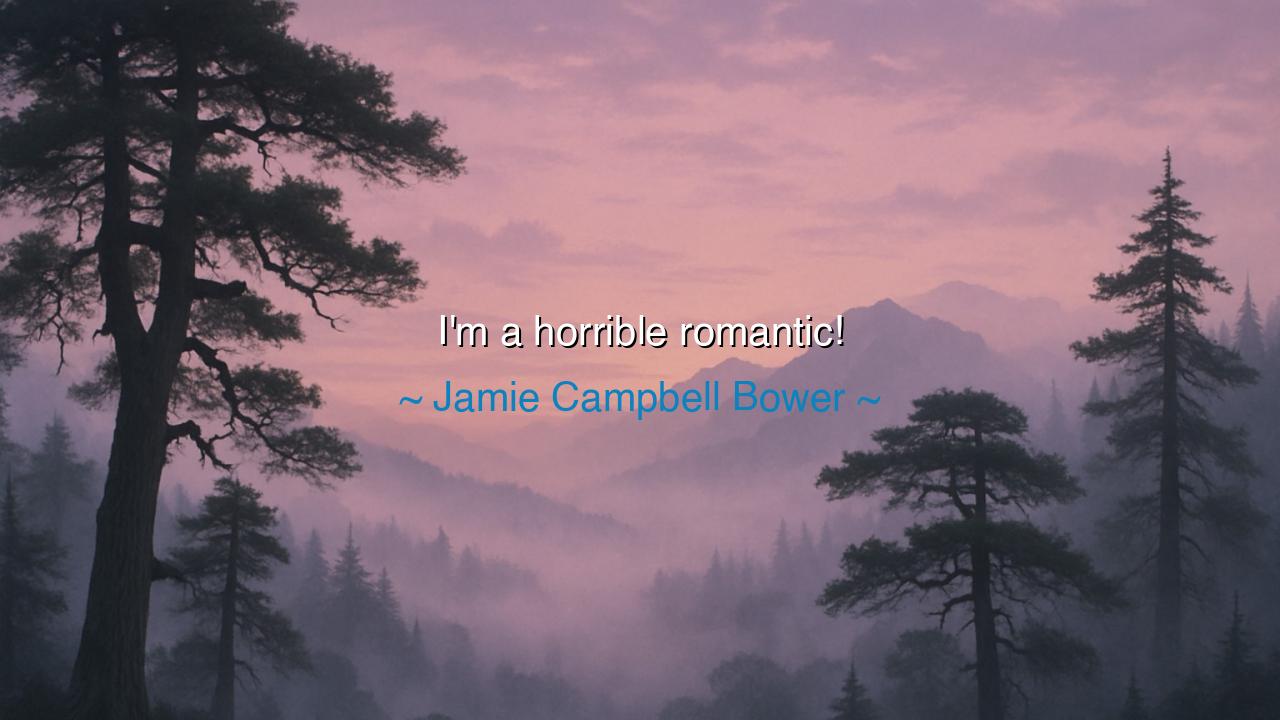
I'm a horrible romantic!






In the candid words of Jamie Campbell Bower, "I'm a horrible romantic!" we encounter an honest confession that speaks to the complex nature of the human heart. To call oneself a "horrible romantic" is to acknowledge the depth of longing, vulnerability, and idealism that often accompanies love, yet also to admit to the potential confusion and frustration that come with such passion. In this statement, Bower highlights the contradictions inherent in being a romantic—a force that can lift us to the heights of joy and hope, yet at the same time, drag us through the murky waters of disappointment and heartache.
The ancients knew well the paradox of the romantic soul—that the pursuit of love and beauty can lead to both great exhilaration and suffering. Take, for example, the myth of Orpheus, the great musician whose love for his wife, Eurydice, led him on a perilous journey to the underworld. Orpheus’s deep romanticism, his longing to reunite with his love, was his strength and his downfall. In his desperation to look at Eurydice as they ascended from the underworld, he lost her forever. This tragic romanticism—this overwhelming desire to love and hold onto something perfect—is what Bower touches on when he humorously calls himself a “horrible romantic.” It is the idealism that often leads the heart to seek love with the utmost sincerity, even when the world is full of uncertainties.
The Greek philosophers, particularly Plato, understood the complexities of romantic love. In his work The Symposium, Plato explores the idea of love not just as an emotion but as a force that drives the soul toward truth and perfection. However, Plato also acknowledged that romanticism, when detached from the realities of life, could lead to both delusion and disappointment. In the story of Phaedrus, Socrates and others discuss how love—when pursued without understanding or balance—can result in pain and heartache. To be a romantic, then, is to be aware of the ideal, yet often fall short in its realization. Bower’s own self-deprecating admission of being a "horrible romantic" reveals an understanding of this delicate balance between hope and frustration.
Throughout history, romantic heroes have often been depicted as flawed individuals whose deep passion led them both to greatness and ruin. Napoleon Bonaparte, for example, was not only a military leader but a man whose deep romantic love for Josephine often clouded his judgment and influenced his decisions in the most significant ways. His obsession with her, while stirring, ultimately led to a disastrous end to their relationship. In the ancient Roman world, Caesar’s relationship with Cleopatra was similarly defined by his romantic pursuits, which brought both glory and conflict. These stories remind us that romanticism, while powerful and consuming, can lead us into realms of uncertainty, where both dreams and disappointments intertwine.
Bower’s humorous confession as a "horrible romantic" speaks not only to the struggles inherent in loving deeply but to the idealism that often accompanies the romantic journey. To be a romantic is to have an unyielding belief in the power of love, yet to also face the harsh reality that love, in its truest form, is not without struggles. It is the romantic who dares to dream, but who is also often caught in the web of unrealized dreams and unspoken expectations. This duality—between the dream and the reality—is the very essence of the romantic journey, as it was for the ancient heroes and as it is for all who seek the truth of love.
The lesson in Bower’s quote, and in the myths and histories of romantic heroes, is one of acceptance and awareness. To love deeply, to be a romantic, is to face the inevitable tensions between the ideal and the real. We may dream of perfect love, and we may seek it with all our hearts, but we must also be prepared to face the challenges and imperfections that come with it. The horrible romantic is not someone who fails in love, but someone who dares to love fully, even when the outcome is uncertain.
In your own life, embrace your romantic nature, but do so with awareness and balance. Love is not just a feeling, but a journey—one filled with both light and shadow. Recognize that disappointment may come, but so too will moments of joy and connection. To be a romantic is to hope, to dream, and to risk. Yet it is also to be wise enough to understand that love’s most profound lessons often come not in the perfect moments of serenade, but in the difficult, messy, and vulnerable ones. Embrace the depth of your own romantic spirit, knowing that in the tension between idealism and reality, you will find the true beauty of the heart.






AAdministratorAdministrator
Welcome, honored guests. Please leave a comment, we will respond soon